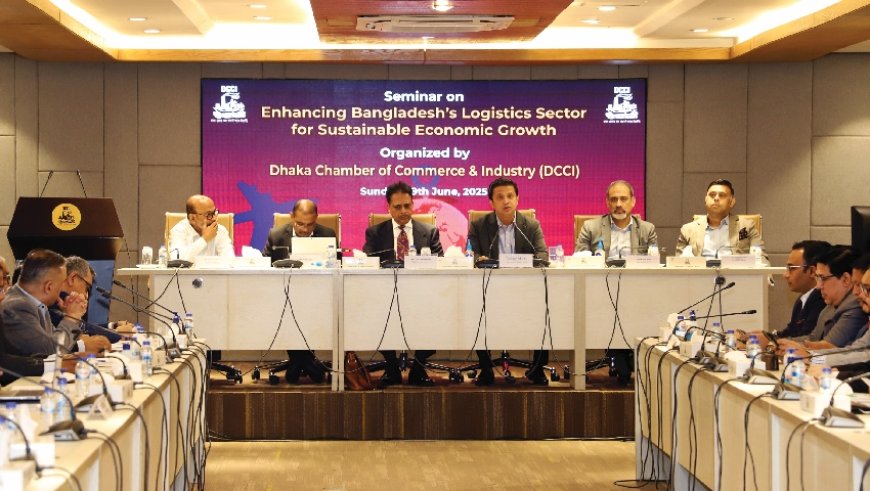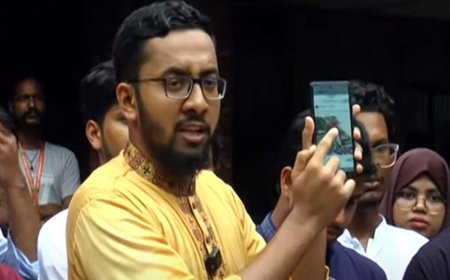Logistics for Long-Term Growth: Stakeholders Stress Global Investment and Infrastructure Upgrades

Global investment, technology sharing, and technical knowledge exchange are indispensable for sustainable logistics development across Bangladesh’s land, river, and seaports, according to industry stakeholders. This was the central message of a seminar titled “Enhancing Logistics Sector Capabilities for Achieving Sustainable Economic Growth in Bangladesh”, organized by the Dhaka Chamber of Commerce & Industry (DCCI) on June 29 at its auditorium in Dhaka.
Speakers at the event emphasized that reducing logistics costs by just 25 percent could boost exports by nearly 20 percent, while a 1 percent reduction in transport costs could increase exports by 7.4 percent. To realize this, an effective implementation of the National Logistics Policy and the formulation of a Sector Development Roadmap Master Plan were deemed crucial. They added that trade facilitation and enhancing logistics capacity are non-negotiable for remaining competitive in the global market.
Dr. M. Masrur Reaz, Chairman and CEO of Policy Exchange Bangladesh, presented the keynote paper. He stated, “Despite decades of private-sector-led economic progress, our over-reliance on a few products—mainly garments—and limited export destinations poses significant risks.” He also stressed the urgency of creating employment opportunities for approximately 2.2 million new entrants to the labor force each year.
Dr. Reaz underscored the importance of export diversification and expansion into new markets, calling for increased foreign investment, technology transfer, and technical collaboration. “There is no alternative to strengthening trade cooperation and logistics capabilities to stay relevant in global competition,” he added.
Dr. Sheikh Mainuddin, Special Assistant to the Chief Advisor (Ministry of Road Transport and Bridges), addressed the seminar as the chief guest. He emphasized the necessity of a multi-modal transport ecosystem integrating roads, railways, waterways, airways, seaports, and information superhighways to ensure post-LDC competitiveness. “Failure to do so will expose our economy to serious challenges,” he warned.
Highlighting inefficiencies, he noted, “If we can reduce logistics costs by 25 percent, we can increase exports by 20 percent. Similarly, a 1 percent drop in transport costs could raise exports by 7.4 percent.” He lamented the absence of a long-term master plan for the logistics sector and revealed that the government is working on an integrated transport system suitable for the next 25 to 50 years. “The private sector must come forward to support this initiative,” he added.
In his welcome speech, DCCI President Taskeen Ahmed referred to the World Bank's Logistics Performance Index 2023, which ranks Bangladesh 88th among 139 countries. “Port congestion, lengthy customs procedures, lack of modern equipment, and poor infrastructure continue to hinder our trade processes,” he said.
He pointed out that 92 percent of the country's foreign trade passes through the ports of Chattogram and Mongla, which together contribute nearly 30 percent to GDP. "Modernizing logistics across all transport modes is urgent—any delay will erode our global competitiveness," he warned.
Abul Kasem Khan, Chairperson of BUILD, expressed concern that Bangladesh's logistics progress has stalled. “To meet our economic targets, we need to invest 8–10 percent of GDP—around USD 20 billion annually—in infrastructure and logistics, but we are lagging far behind,” he said.
Md. Habibur Rahman, Additional Secretary of the Chattogram Port Authority, shared that by 2030, the capacity of seaports in Bangladesh is expected to reach 10 million TEUs. “The private sector must significantly ramp up import-export activities to utilize this capacity,” he said. He also pointed out that as land availability decreases by about 2 percent every five years, railways may emerge as the most cost-effective logistics solution.
The panel discussion featured Md. Habibur Rahman (CPA), Alamgir Morshed (ED, IDCOL), Shamim Ul Haque (Country Director, DP World Bangladesh), Nakib Khan (President, Bangladesh Supply Chain Management Society), and Humayun Kabir (Senior Project Officer, ADB).
In the open forum, former CPA Chairman Rear Admiral (Retd.) M Khaled Iqbal, BARVIDA President Abdul Haque, former DCCI President Osama Taseer, former Vice President M Abu Horaira, former Director AKD Khayer Mohammad Khan, and Standing Committee Convener Abrarul Alam participated. They called for more private inland container depots (ICDs), increased dredging to improve navigability, port-centric economic activities, and enhanced inter-agency coordination.
Senior Vice President Rajib H. Chowdhury, Vice President Md. Salim Solaiman, DCCI board members, and relevant stakeholders were also present.









































































































































































































